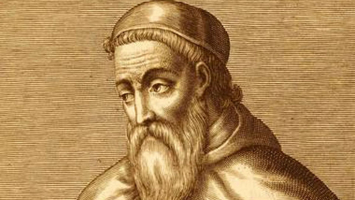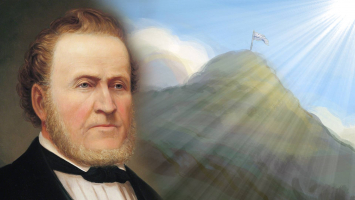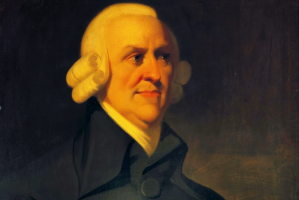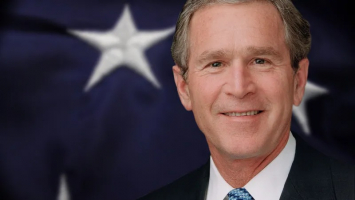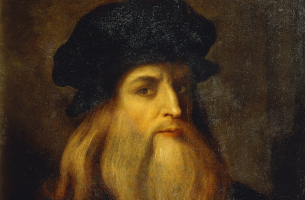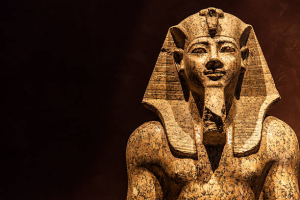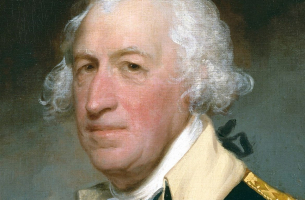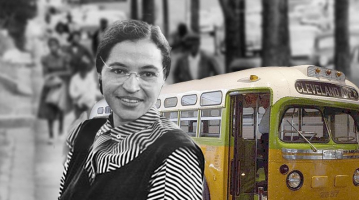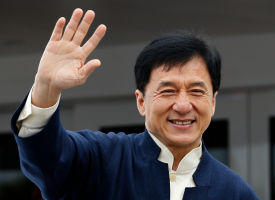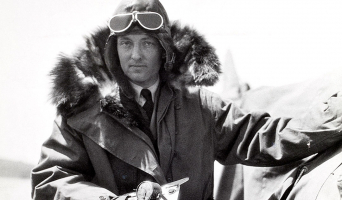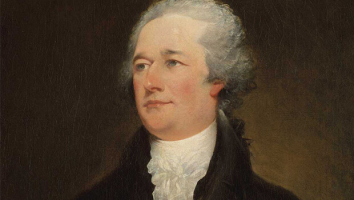Top 12 Facts About Juneteenth
Juneteenth, official name of federal holiday Juneteenth National Independence Day, also called Emancipation Day, Freedom Day, Jubilee Day, Black Independence ... read more...Day, and Juneteenth Independence Day, is the oldest nationally-celebrated commemoration of the ending of slavery in the United States. Let's go back to history, and learn about this holiday by exploring the following interesting facts.
-
The Emancipation Proclamation was issued by Abraham Lincoln on September 22, 1862. It went into effect on January 1, 1863. However, slaves were not set free in the Confederacy until the Union army was able to come in and take over. On June 18, 1865, the Union army arrived in Galveston, Texas. The next day, June 19th, General Gordon Granger announced that the slaves in Texas were free by order of the president of the United States. This event marked the point when enslaved people were officially set free, and Juneteenth was decided to be the day to celebrate such event.
News traveled slowly back in those days—it took Confederate soldiers in western Texas more than two months to hear that Robert E. Lee had surrendered at Appomattox. Still, some have struggled to explain the 30-month gap between Lincoln’s proclamation and the enslaved people’s freedom, leading to speculation that some Texans suppressed the announcement. Other theories include that the original messenger was murdered to prevent the information from being relayed or that the federal government purposely delayed the announcement to Texas to get one more cotton harvest out of the enslaved workers. But the real reason is probably that Lincoln's proclamation simply wasn't enforceable in the rebel states before the end of the Civil War.
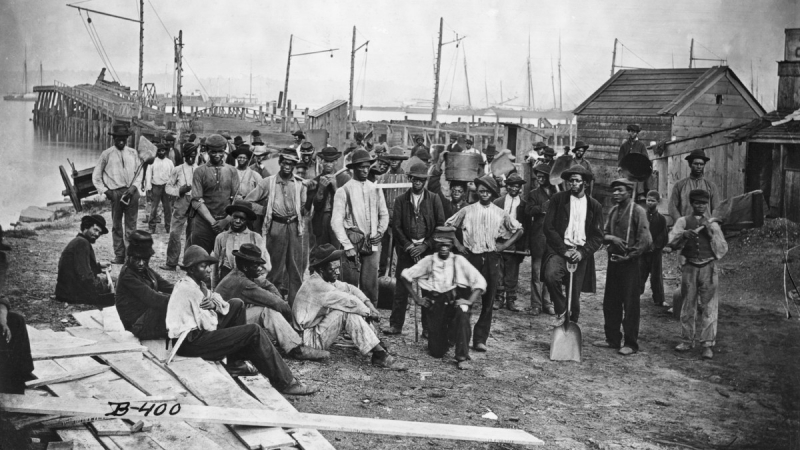
Photo: www.history.com 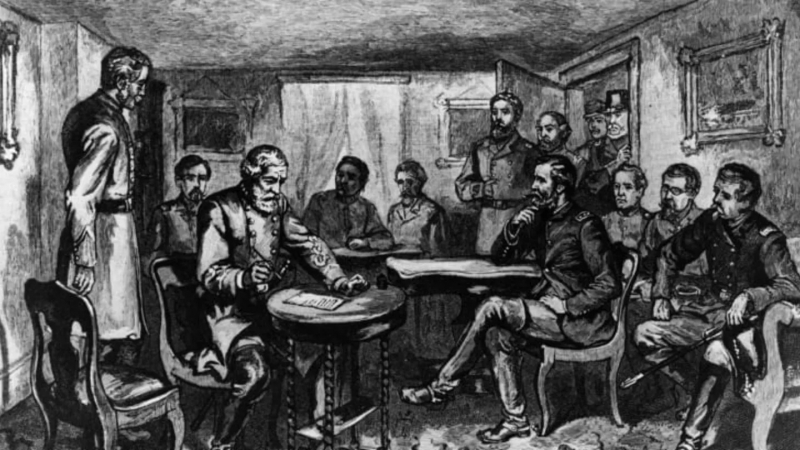
Photo: www.mentalfloss.com -
Abraham Lincoln issued the Emancipation Proclamation on January 1, 1863. The Emancipation Proclamation freed slaves in states and then in rebellion against the United States. The Proclamation applied to more than 3.5 million of the 4 million enslaved people in the country. Around 25,000 to 75,000 were immediately emancipated in those regions of the Confederacy where the US Army was already in place. It could not be enforced in the areas still in rebellion, but, as the Union army took control of Confederate regions, the Proclamation provided the legal framework for the liberation of more than three and a half million enslaved people in those regions by the end of the war. Union troops operating in said states gave teeth to the Proclamation. This, however, did not apply to the border states.
The Juneteenth announcement came more than two-and-a-half years after Abraham Lincoln issued the Emancipation Proclamation. So technically, from the Union's perspective, the 250,000 enslaved people in Texas were already free, but none of them were aware of it. During that period of time, they still lived how they did before, which was as enslaved people. Even though the people in the upper class knew, no one was in a rush to inform them about the fact that they have already been emancipated.
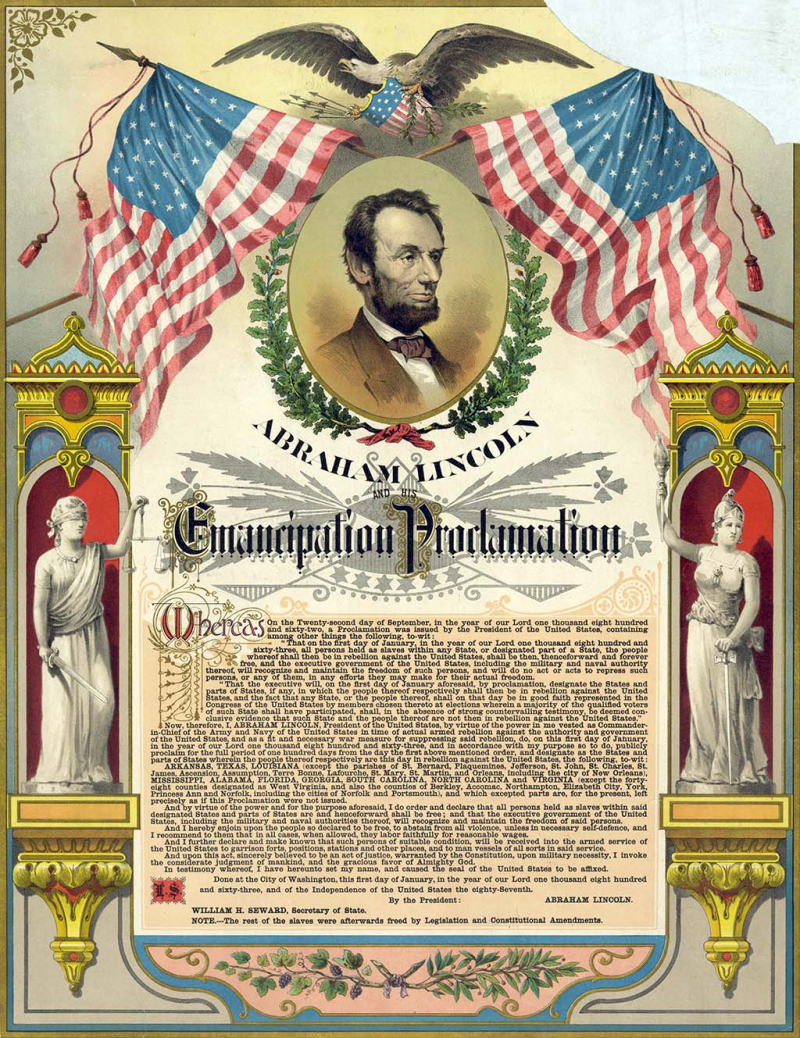
Photo: www.blackpast.org 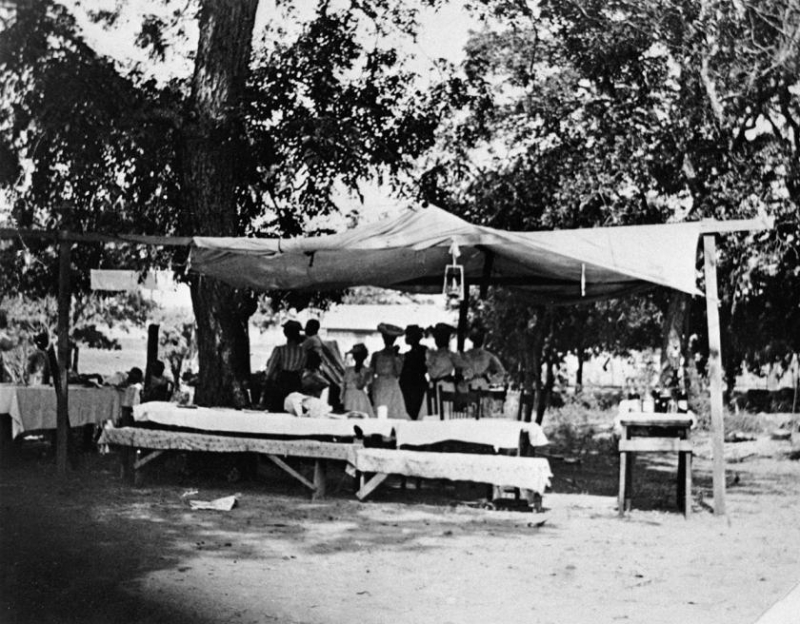
Photo: www.battlefields.org -
The Civil War ended in the summer of 1865. Union General Gordon Granger and his troops traveled to Galveston, Texas to announce General Order No. 3 on June 19th, 1865. The event on June 19th would go on to be known and celebrated as Juneteenth. However, the announcement consumes information that might surprise people nowadays. We would think that this announcement would encourage African American slaves to get away from their owner who was the reason why they were tied to the title "slave", but it actually did quite the opposite - it encourage them to stay with their owners and work for them.
General Order No. 3, as read by General Granger, said: "The people of Texas are informed that, in accordance with a proclamation from the Executive of the United States, all slaves are free. This involves an absolute equality of personal rights and rights of property between former masters and slaves, and the connection heretofore existing between them becomes that between employer and hired labor. The freedmen are advised to remain quietly at their present homes and work for wages. They are informed that they will not be allowed to collect at military posts and that they will not be supported in idleness either there or elsewhere."
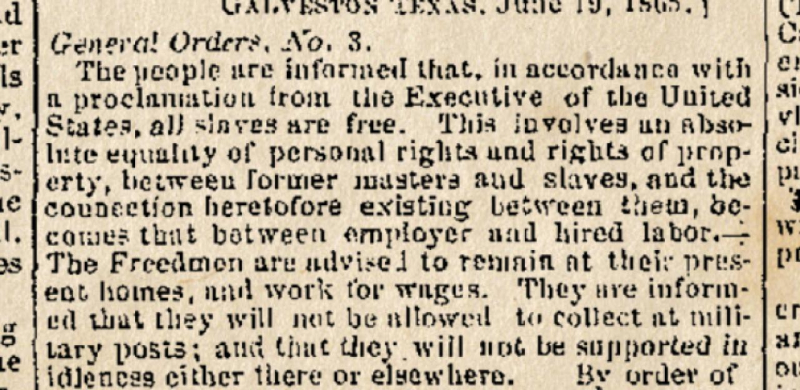
Photo: www.battlefields.org 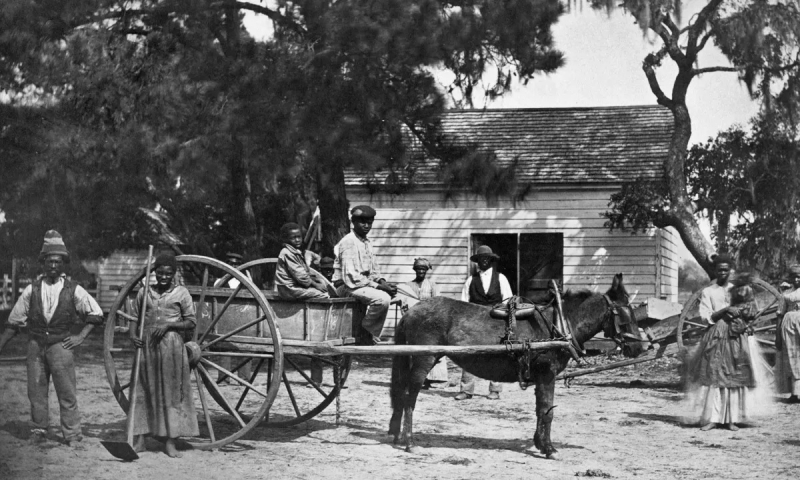
Photo: www.theguardian.com -
As an understandable response - most freed people after the announcement weren't terribly interested in staying with their past owners, the people who had enslaved them, even if payment was involved. In fact, some freed people were even leaving before Granger had finished making the announcement to show their disappointment and disagreement with the terms of the Juneteenth announcement.
In the following weeks, some freed people listened to the order and stayed, but many did not and escaped their captors as soon as possible. Some knew about the event later but still chose freedom. Stories about the days were told: “When freedom was declared, the master wouldn’t tell them, but mother, she heard him telling mistress that the slaves were free, but they didn’t know it, and he was not going to tell ‘em till he had made another crop or two. When mother heard that, she said she slipped out of the chimney corner and cracked her heels together four times, and shouted, “I’s free, I’s free.” Then she ran to the field, against master’s will, and told all the other slaves, and they quit work.”
Just like that, after the Juneteenth announcement, formerly enslaved people left Texas in great numbers to find family members and make their way to the postbellum United States. That period of time is known as the "Scatter".
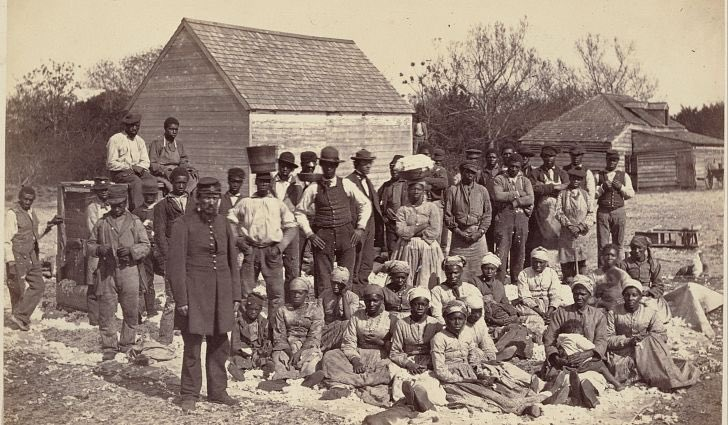
Photo: Shelby Ivey Christie on Twitter 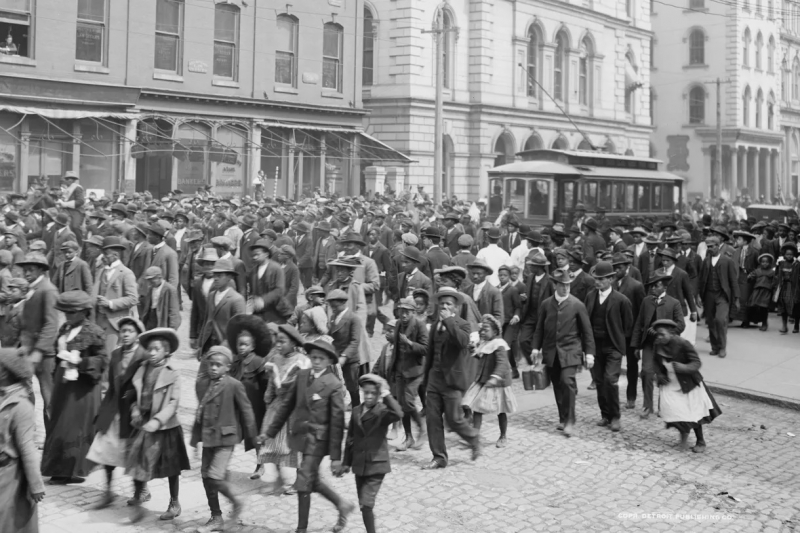
Photo: www.vox.com -
Despite the announcement, not all enslaved people were freed instantly. Texas is a large state, and General Granger's order (and the troops needed to enforce it) was slow to spread. In July 1867, there were two separate reports of enslaved people being freed, and one report of a Texas horse thief named Alex Simpson, whose enslaved people were only freed after his hanging in 1868. After being free, many people chose to leave their former owners to find their lost family members and start their new life across the state. However, what comes after Juneteenth is another problem that freed black people had to face brutally.
Despite the announcement, Texas enslavers weren't too eager to part with what they felt was their property. And many slave owners at the time felt as if black people who have been working for them were their property, and would not let them go either. When freed people tried to leave, many of them were beaten, lynched, or murdered. Many owners even got on their horses, and formed a group of people to go around their land and look for the black people who they thought of as escapers. "They would catch [freed slaves] swimming across [the] Sabine River and shoot them," a former enslaved person named Susan Merritt recalled. Even those who have successfully escaped, found uncountable troubles when they tried to start a new life as a free man.
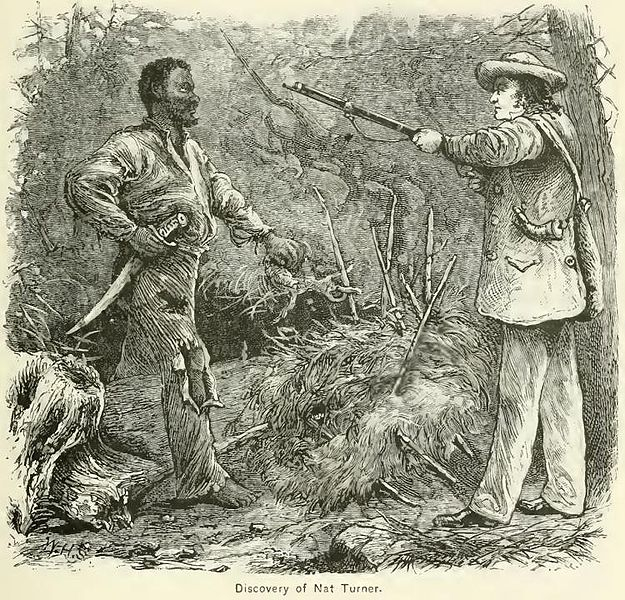
Photo: www.pbs.org 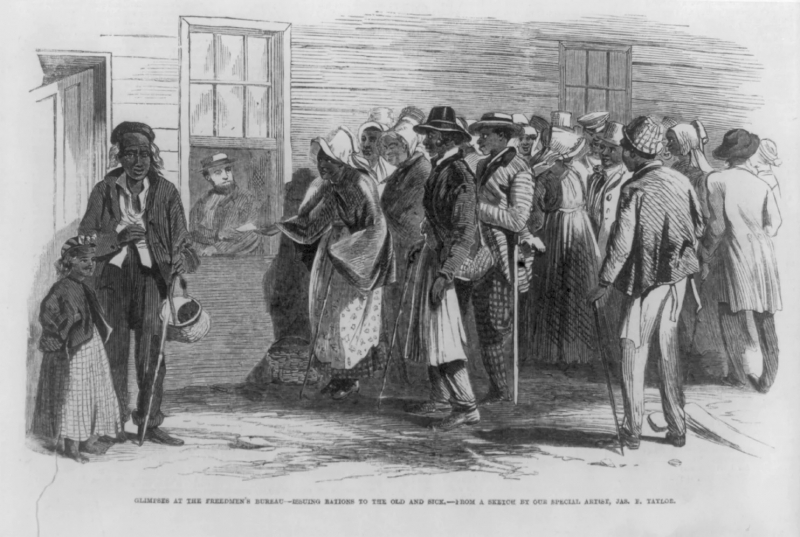
Photo: www.washingtonpost.com -
When freed people tried to celebrate the first Juneteenth - the anniversary of the announcement a year later, they faced a big problem: Segregation laws were expanding rapidly, so there were no public places or parks they were permitted to use, as, before the announcement, there were only places for white people to use, and slaves didn't seem by owners to be deserving to do anything like events in publics. In the 1870s, formerly enslaved people pooled together $800 and purchased 10 acres of land, which they deemed "Emancipation Park." Until the 1950s, it was the only public park and swimming pool in the Houston area that was open to African Americans.
However, another problem that black people had to face, is how to maintain their life since they had many struggles living as newly freed people, as Jamelle Bouie so eloquently put it in Slate, "it's difficult to celebrate freedom when your life is defined by oppression on all sides." Juneteenth celebrations waned during the era of Jim Crow laws until the civil rights movement of the 1960s when the Poor People's March planned by Martin Luther King Jr. was purposely scheduled to coincide with the date. The march brought Juneteenth back to the forefront, and when march participants took the celebrations back to their home states, the holiday was reborn.
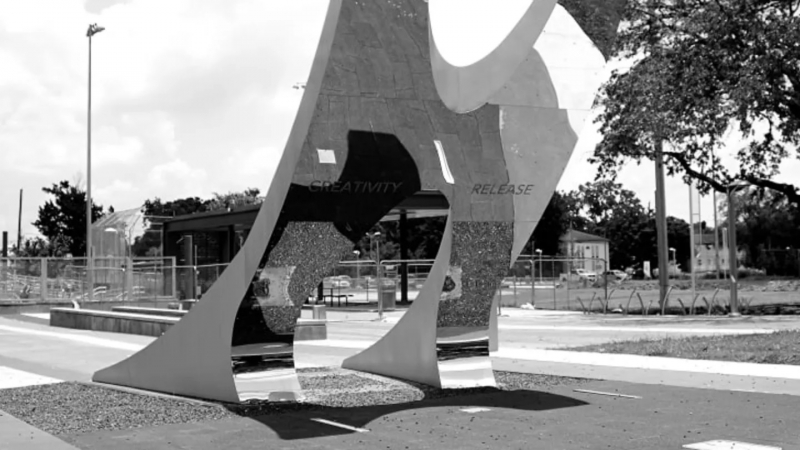
Photo: www.mentalfloss.com 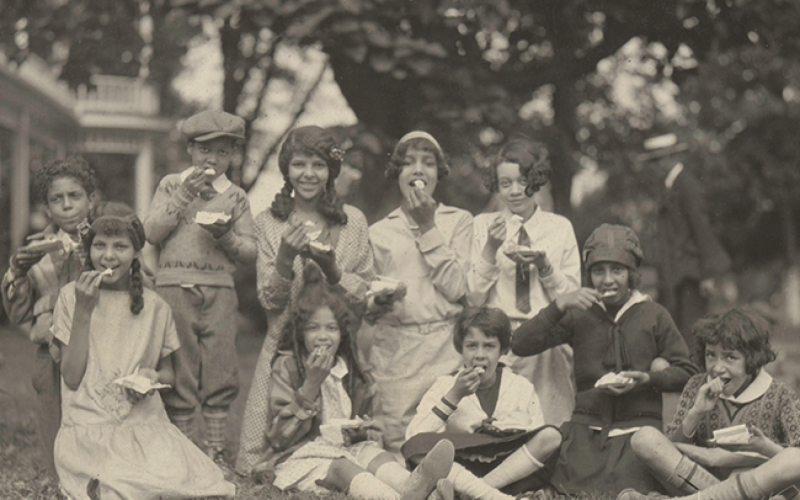
Photo: nmaahc.si.edu -
Freedom finally came for black people on June 19, 1865, when some 2,000 Union troops arrived in Galveston Bay, Texas. The army announced that the more than 250,000 enslaved black people in the state, were free by executive decree. This day came to be known as "Juneteenth," by the newly freed people in Texas. Juneteenth was originally celebrated in Texas, on June 19, 1866. It marked the first anniversary of the day that African Americans there first learned of the Emancipation Proclamation, more than two years after it was initially issued.
Texas House Bill 1016 passed in the 66th Legislature, Regular Session, declared June 19, "Emancipation Day in Texas," a legal state holiday effective starting in 1980. Since that time, the celebration of Juneteenth continues across the state of Texas with parades, picnics, and dancing. But it was not until the racial reckoning sparked by the police murder of George Floyd in 2020 that momentum built elsewhere for federal and state Juneteenth holidays.
Following texas, many other states deemed Juneteenth holidays worthy of statewide recognition. Nowadays, All 50 states either commemorate or observe Juneteenth but only 18 observe it as a permanent paid state holiday, those being Colorado, Connecticut, Delaware, Georgia, Illinois, Louisiana, Maine, Massachusetts, Maryland, Nebraska, New Jersey, New York, Ohio, Oregon, South Dakota, Texas, Virginia, and Washington.
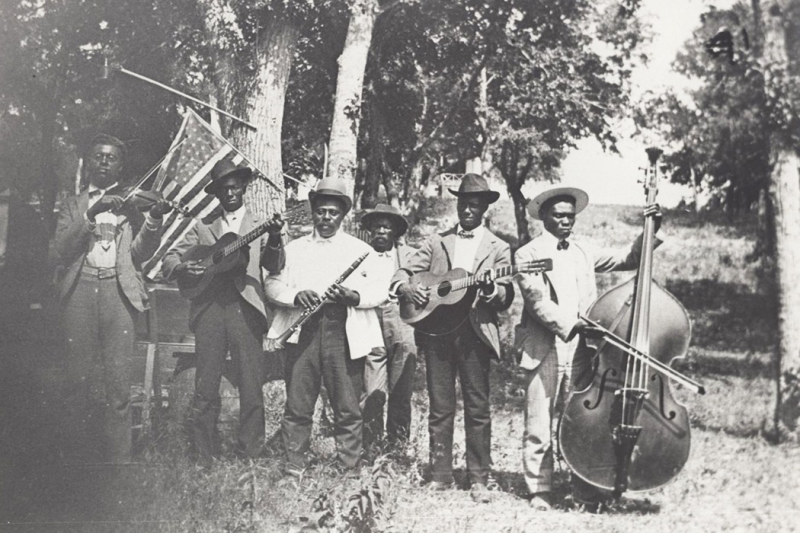
Photo: daily.jstor.org 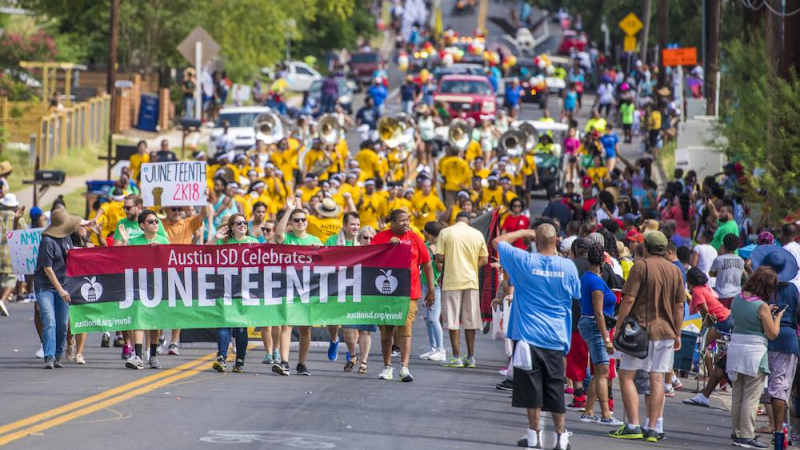
Photo: www.unitedwayaustin.org -
In 1996, the first federal legislation to recognize "Juneteenth Independence Day" was introduced in the U.S. House of Representatives, H.J. Res. 195, sponsored by Barbara-Rose Collins (D-MI). In 1997, Congress recognized the day through Senate Joint Resolution 11 and House Joint Resolution 56. In 2013, the U.S. Senate passed Senate Resolution 175, acknowledging Lula Briggs Galloway (late president of the National Association of Juneteenth Lineage), who "successfully worked to bring national recognition to Juneteenth Independence Day", and the continued leadership of the National Juneteenth Observance Foundation.
By 2016, 45 states were recognizing the occasion. That year, Opal Lee, often referred to as the "grandmother of Juneteenth", began a walk from Fort Worth, Texas to Washington D.C. to advocate for a federal holiday. Thanks to Opal Lee's efforts, on June 17, 2021, President Biden signed the Juneteenth National Independence Day Act, which officially made Juneteenth a federal holiday.
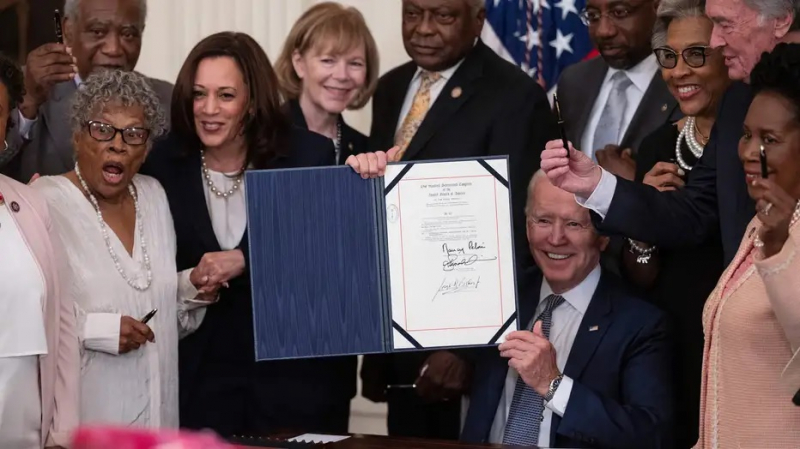
Photo: www.fox4news.com 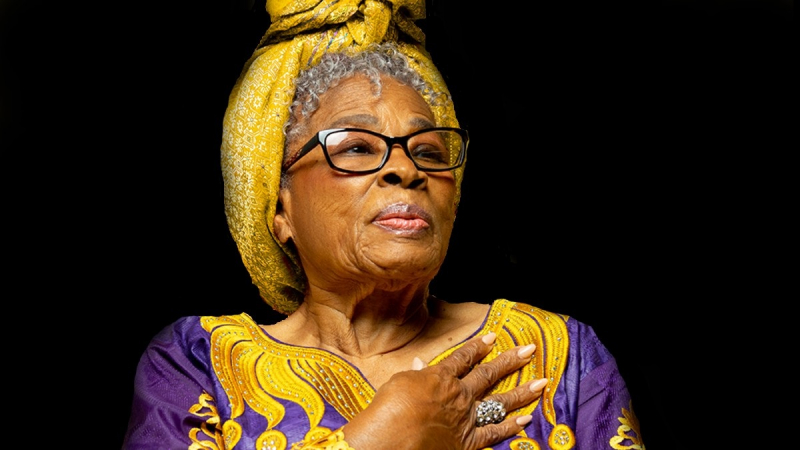
Photo: www.marshallnewsmessenger.com -
Juneteenth flag designer L.J. Graf packed lots of meaning into her design. The colors red, white, juneteenth flag designer L.J. Graf packed lots of meaning into her design. The colors red, white, and blue echo the American flag to symbolize that the enslaved people and their descendants were Americans. The star in the middle pays homage to Texas, while the bursting "new star" on the "horizon" of the red and blue fields represents a new freedom and a new people.d blue echo the American flag to symbolize that the enslaved people and their descendants were Americans. The star in the middle pays homage to Texas, while the bursting "new star" on the "horizon" of the red and blue fields represents a new freedom and a new people.
The flag was first flown in 2000, at Boston's Roxbury Heritage State Park. Ben Haith initiated the Boston flag-raising. Beginning in 2020 in the United States, several state governors ordered the Juneteenth flag to be raised over their capital buildings on June 19. In 2020, Wisconsin Governor Tony Evers ordered the flag to be flown for the month of June. When the flag was raised in Wisconsin, state senator Lena Taylor of Milwaukee and the Wisconsin Legislative Black Caucus celebrated by raising their fists. Also in 2020, the flag was raised over the Cincinnati City Hall. In Illinois, Governor Pritzker ordered the flag to be flown above the Illinois State Capitol on June 19, 2021. In 2021 President Joe Biden signed a law marking Juneteenth as a federal holiday.
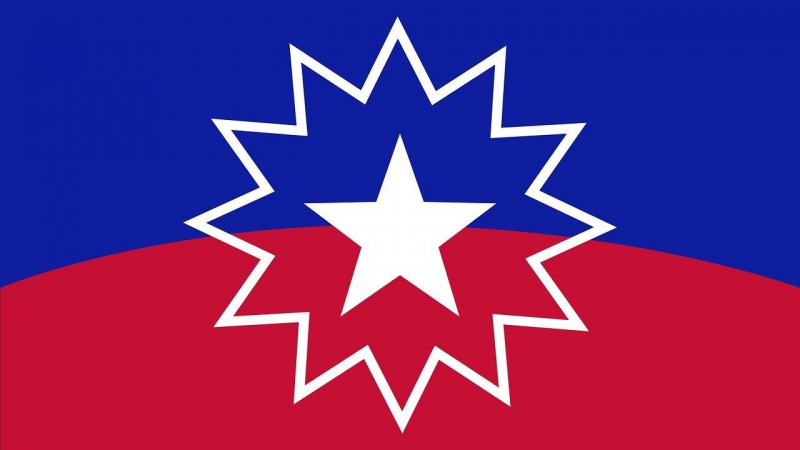
Photo: www.dwell.com 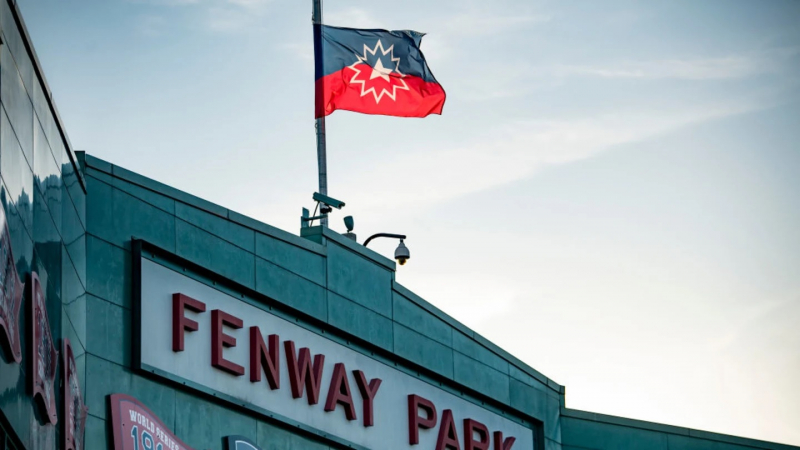
Photo: www.mentalfloss.com -
In the subsequent years and decades, the Black American community has celebrated the occasion to various extents – before Juneteenth officially became a universal American holiday through an act of Congress that President Joe Biden signed into law on June 17, 2021. In only its second year of federal recognition, Juneteenth has already brought forth an array of historically nuanced, remarkably creative, and innovative cultural events. Read on to get inspired by major Juneteenth celebrations planned in cities throughout the USA.
As the tradition of Juneteenth spread across the U.S., different localities put different spins on celebrations. In Southern states, the holiday is traditionally celebrated with oral histories and readings, "red soda water" or strawberry soda, and barbecues. Some states serve up Marcus Garvey salad with red, green, and black beans, in honor of the black nationalist. Rodeos have become part of the tradition in the southwest, while contests, concerts, and parades are a common theme across the country. Especially in New York - The city that never sleeps will be offering a weekend-long program of artistic and athletic events, ranging from an exhibition at the Park Avenue Armory featuring newly discovered work by artist Archer Aymes to a family-friendly Juneteenth march through Central Park, plus a festive Juneteenth 5K Run in Brooklyn Bridge Park.
Video: ABC News 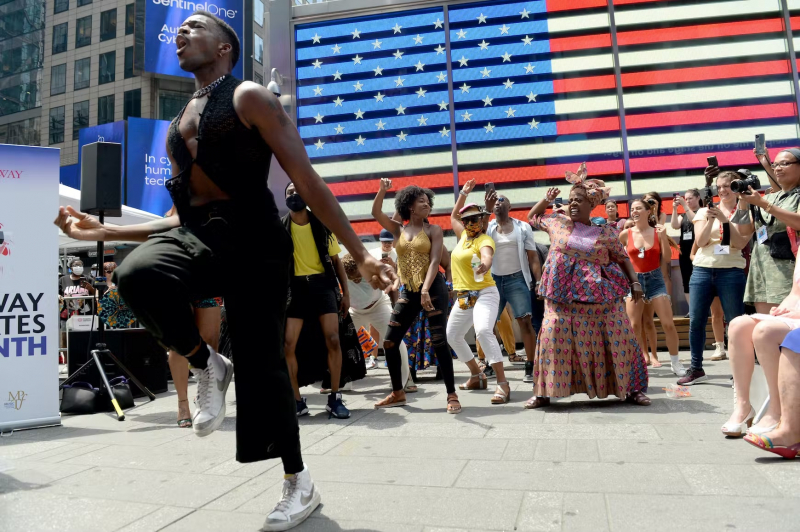
Photo: www.lonelyplanet.com -
Black communities in Galveston and across the country celebrate Juneteenth holiday through a variety of traditions — one of which is the Miss Juneteenth and Little Miss Juneteenth pageants. The original pageant is the one in the Dallas-Fort Worth area. But, over the years, Fort Worth’s Miss Juneteenth pageant has become even more significant: It’s a chance for Black girls in Texas to promote the historic holiday and gain funding for college while commemorating the pain and joy of the life-changing day. Similar pageants have popped up in Texas and several other states over the years, and 2020 marked the first National Miss Juneteenth Pageant held in Tennessee. Delaware’s Miss Juneteenth, Saniya Gay, claimed the national title.
The girl who is qualified to be crowned Miss Juneteenth will accept her crown after participating in a four-day long pageant that included categories for essay writing, interview questions, talent, and evening gown. Miss Juneteenth will receive prizes including A $1,000 scholarship to the junior college, college, or training institute of her choice. But it’s also so much more than that.
The special pageant that celebrates Juneteenth was even the subject of the 2020 film “Miss Juneteenth,” by Channing Godfrey Peoples about a single mother (played by Nicole Beharie), who wants her 15-year-old daughter (Alexis Chikaeze) to win the Fort Worth pageant. Former Miss Juneteenth Triniti Franklin made an appearance in the film.
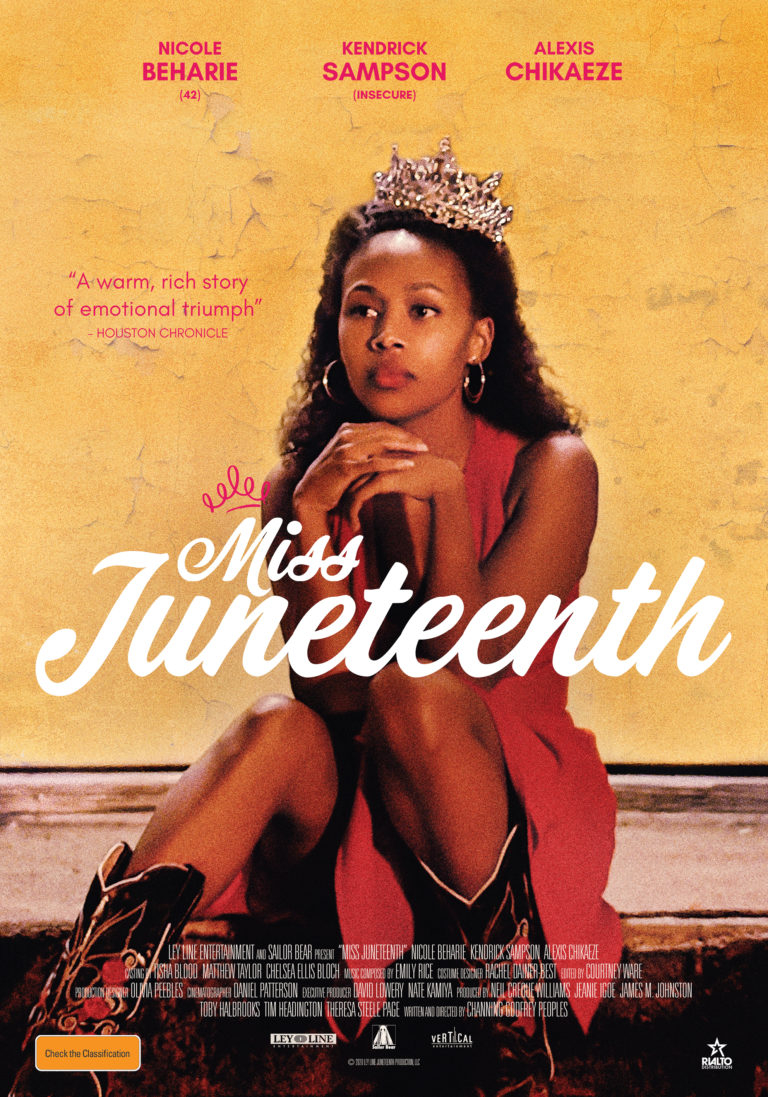
Photo: www.imdb.com Video: NBC News -
Juneteenth has always been a day intended for the celebration of freedom. Today, it is more than just a celebration; it is a time of reflection. It gives us the space to learn more about the significance of this important day and to have conversations with people who come from different backgrounds and experiences. It can be a step toward reconciliation and healing as we strive to achieve racial equality and justice in our world.
Therefore, as the United States marks only the second federally recognized Juneteenth, Black Americans living overseas have embraced the holiday as a day of reflection and an opportunity to educate people in their host countries on Black history. In Liberia, Saqar Ahhah Ahershu, originally from Jersey City, N.J., organized the country’s first “Journey Home Festival” in 2022. “Because this is part of that hidden African American history that still hasn’t been completely unpacked,” he said in Monrovia. Tashina Ferguson, a 26-year-old debate coach, also celebrated Juneteenth with a group of drag performers at a fundraising brunch for the Marsha P. Johnson Institute in Korea. LaTonya Whitaker, from Mississippi, has lived in Japan for 17 years and also is executive director of Legacy Foundation Japan, which hosted a Juneteenth gathering of about 300 people at the ritzy Tokyo American Club.
And many other African American living around the world are putting efforts to celebrate Juneteenth as a day of freedom, pray for justice and against racism, and strive to make a difference right where they are.
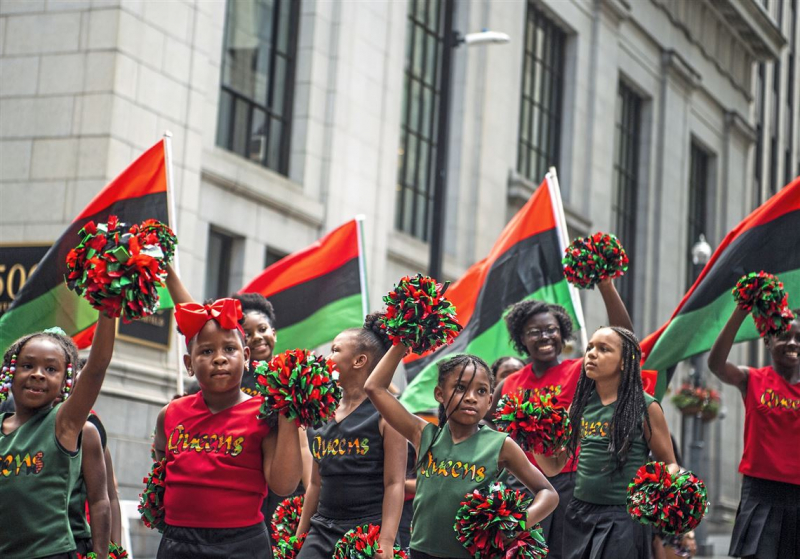
Photo: www.post-gazette.com 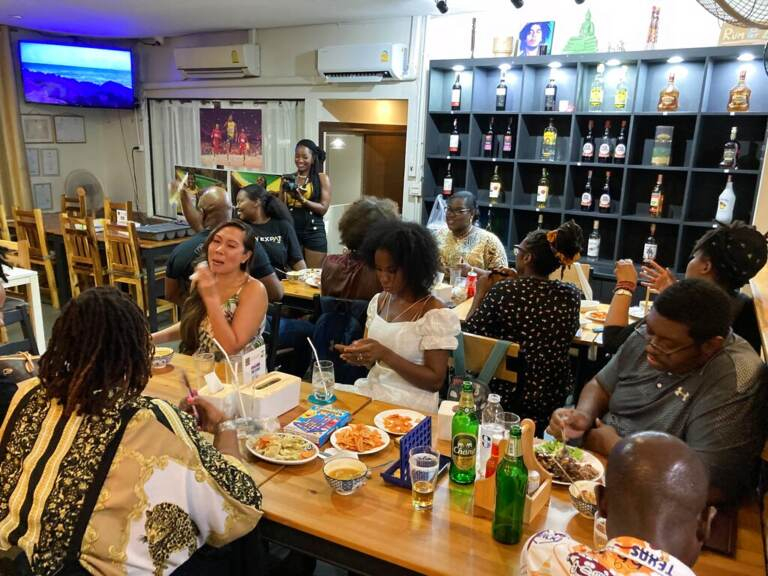
Photo: whyy.org


















